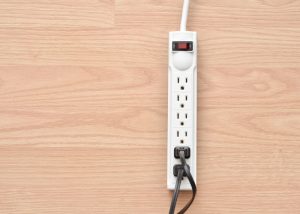 If your home is like most throughout the Eugene area, then there is more electrical equipment in it than even just a couple of decades ago, right? You likely have multiple devices connected to your power supply at any given time. You likely have a handful of charging stations handling your portable devices, too.
If your home is like most throughout the Eugene area, then there is more electrical equipment in it than even just a couple of decades ago, right? You likely have multiple devices connected to your power supply at any given time. You likely have a handful of charging stations handling your portable devices, too.
What’s the best way to protect them in the case of a power surge? It’s important to know the answer to this since power surges actually happen all the time (not just when there is a storm) and voltage spikes can and will cause irreparable damage to complex electrical systems.
“Do I really need to worry?” you may be asking, “After all, I have power strips at all of my outlets!”
Here’s the thing—power strips don’t offer the kind of protection your appliances and electrical equipment needs. Whole-house surge protection is the answer. Read on to learn more!
The Problem with Power Surges
A power surge, also known as a voltage spike, is when there is a sudden increase in voltage through the electrical system. A surge is capable of melting wires, and circuit breakers to trip (or fuses to blow, if you still have a fuse box). People tend to think of these power surges as being associated with lightning. Lightning strikes can cause power surges, but there are other sources for these voltage spikes.
Problems in the local power plant can cause surges throughout the grid, for example. But many surges actually come from inside your own home! When a powerful electrical appliance turns on—like your HVAC system—it can cause an imbalance in the electrical current, creating a surge. Have you ever noticed the lights in your house dim and brighten back up when the AC or compressor to your refrigerator kicks in? This is what a power surge looks like.
Power Strips Aren’t the Solution
Power strips are useful, of course. And they are a safer alternative to the older octopus plugs that used to enable more appliances to be plugged into a single outlet. Plus, a power strip contains its own circuit breaker, so if there is a voltage spike the whole strip will shut off power, to prevent damage to the appliances plugged into it.
So, we don’t discourage power strips. However, they shouldn’t be used as your only line of defense against power surges. A massive voltage spike can overcome a power strip, and many of the lesser surges won’t actually cause them to activate, which allows accumulative damage to occur.
Investing in a Whole-House Solution
The best surge protection you can get for your home is a whole-house surge protector. Our professional electricians will install this directly into the electrical panel of your home. This panel is where the electricity from the grid enters your home and divides it into individual circuits. A surge protector on the panel sends excess voltage down into the ground, instead of into the electrical system.
This prevents the voltage spike from reaching the rest of the house, and it’s capable of handling extreme surges from storms and power plant troubles.
Contact Comfort Flow Heating when you need a trustworthy Eugene electrician!

